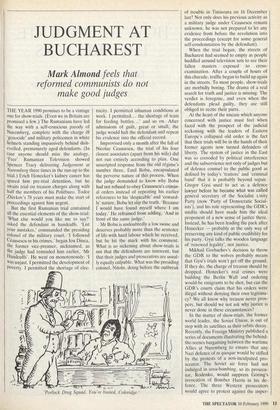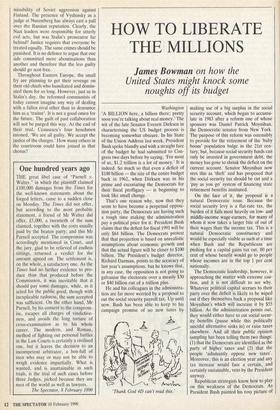JUDGMENT AT BUCHAREST
Mark Almond feels that
reformed communists do not make good judges
THE YEAR 1990 promises to be a vintage one for show-trials. (Even we in Britain are promised a few.) The Rumanians have led the Way with a self-conscious parody of Nuremberg, complete with the charge Of `genocide' and military policeMen in white helmets standing impassively behind dish- evelled, prematurely aged defendants. (In case anyone should miss the analogy, 'Free' 1 Rumanian Television showed Spencer Tracy delivering Judgement at Nuremberg three times in the run-up to the trial.) Erich Honecker's kidney cancer has spared him pre-trial detention, but he awaits trial on treason charges along with half the members of his Politburo. Todor Zhivkov's 78 years must make the start of proceedings against him urgent.
But the first Rumanian trial contained all the essential elements of the show-trial: 'What else would you like me to say?' asked the defendant in handcuffs. 'List Your mistakes,' commanded the presiding colonel of the military court. 'I followed Ceausescu in his crimes,' began Ion Dinca, the former vice-premier, nicknamed, as the judge had reminded him earlier, `Mr Handcuffs'. He went on monotonously: 'I was unjust. I permitted the development of poverty. I permitted the shortage of elec- tricity. I permitted inhuman conditions at work. I permitted... the shortage of teats for feeding bottles...' and so on. After admissions of guilt, great or small, the judge would halt the defendant and repeat his evidence into the official record.
Improvised only a month after the fall of Nicolae Ceausescu, the trial of his four Closest associates (apart from his wife) did not run entirely according to plan. One unscripted response from the old regime's number three, Emil Bobu, encapsulated the perverse nature of this process. When the judge demanded to know why Bobu had not refused to obey Ceausescu's crimin- al orders instead of repeating his earlier references to his 'despicable' and 'coward- ly' nature, Bobu let slip the truth. 'Because I would have found myself where I am today.' He refrained from adding, And in front of the same judge.'
Mr Bobu is undoubtedly a low swine and deserves probably more than the sentence of life with hard labour which he received, but he hit the mark with his comment. What is so sickening about show-trials is not that the defendants are innocent, but that their judges and prosecutors are usual- ly equally culpable. What was the presiding colonel, Nitcin, doing before the outbreak 'Porlock Drug Squad. You're busted, Coleridge.' of trouble in Timisoara on 16 December last? Not only does his previous activity as a military judge under Ceausescu remain unknown, he was not prepared to 'let any evidence from before the revolution into the proceedings (except for some general self-condemnation by the defendant), When the trial began, the streets of Bucharest had seemed to empty as people huddled around television sets to see their fallen masters exposed to cross- examination. After a couple of hours of this charade, traffic began to build up again in the streets. To most people, show-trials are morbidly boring. The drama of a real search for truth and justice is missing. The verdict is foregone, and even when the defendants plead guilty, they are still obliged to recite their parts.
At the heart of the unease which anyone concerned with justice must feel when faced with the prospect of the judicial reckoning with the leaders of Eastern Europe's collapsed old order is the fact that their trials will be in the hands of their former agents now turned defenders of liberty. The system of justice in the. East was so corroded by political interference and the subservience not only of judges but of defence counsel to the public good as defined by today's 'traitors' and 'criminal band' that it is probably beyond repair. Gregor Gysi used to act as a defence lawyer before he became what was called general secretary . of the Socialist Unity Party (now `Party of Democratic Social- ists'), and his role representing the GDR's misfits should have made him the ideal proponent of a new sense of justice there. Instead, he has been leading the pack after Honecker — probably as the only way of preserving any kind of public credibility for his party. Gysi talks the wooden language of 'renewed legality', not justice.
Mikhail Gorbachev's decision to throw the GDR to the wolves probably means that Gysi's trials won't get off the ground. If they do, the charge of treason should be dropped. Honecker's real crimes were building the Berlin Wall and ordering would-he emigrants to he shot, but can the GDR's courts claim that his orders were illegal without denying their own legitima- cy? We all know why treason never pros- pers, but should we not ask why justice is never done in these circumstances?
In the matter of show-trials, the former world leader, the Soviet Union, is out of step with its satellites as their orbits decay. Recently, the Foreign Ministry published a series of documents illustrating the behind- the-scenes bargaining between the wartime Allies at Nuremberg to ensure that any Nazi defence of to quoque would be stifled by the protests of a non-inculpated pro- secutor. The Soviet air force had not indulged in area-bombing, so its prosecu- tor, Rodenko, would suppress Goring's invocation of Bomber Harris in his de- fence. The three Western prosecutors would agree to protest against the imper-
missibility of Soviet aggression against Finland. The presence of Vyshinsky as a judge at Nuremberg has always cast a pall over the Russian reputation. Clearly, the Nazi leaders were responsible for utterly evil acts, but was Stalin's prosecutor far behind? Justice requires that everyone be treated equally. The same crimes should be punished. It is no defence to argue that one side committed more abominations than another and therefore that the less guilty should go scot-free.
Throughout Eastern Europe, the small fry are planning to get their revenge on their old chiefs who humiliated and domin- ated them for so long. However, just as in Stalin's day, the reformed communists of today cannot imagine any way of dealing with a fallen rival other than to denounce him as a 'traitor'. It is not a good omen for the future. The guilt of past collaboration will not be purged this way. At the end of their trial, Ceausescu's four henchmen intoned, 'We are all guilty. We accept the justice of the charges.' How many others in the courtroom could have joined in that chorus?



















































 Previous page
Previous page